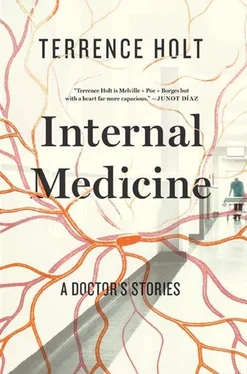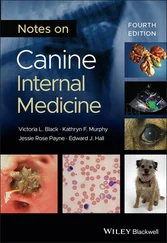Finally, his voice coming with effort, Mr. Jenkins said, “What’s it gonna do?”
Patients have this terrifying ability to ask the question, the one of all others you don’t want laid at your feet. I could feel myself start to choke. The easy answer, the immediate one, was I don’t know , but I couldn’t bring myself to say it — it would be too palpably a lie. Because I did know. We both knew. But I couldn’t say that either.
I was wrestling with all of this, starting to hyperventilate, when I heard Mr. Jenkins sigh. “That’s a bad question,” he said. The ghost of a smile shimmered in the dim light. He settled back against his pillow, ran the back of a thin hand across his forehead. “Ain’t nobody knows, do they.”
“That’s right,” I said fervently. “But, Mr. Jenkins, I do know this. There are a lot of people in this hospital who can help you. The next thing that will happen is we’ll present your case”—no, I thought, too legal—“we’ll present you”—too formal—“we’ll bring in a lot of specialists”—that was it: “specialists” had a reassuring ring—“and we’ll help you fight this thing.” Unless, of course, fighting wasn’t what he wanted. What if he didn’t want to fight it? I was just about to babble, I realized. “Would you like to see the chaplain, Mr. Jenkins?”
Mr. Jenkins lay back on his pillow with his left arm beside his head, fingers curled delicately as if waiting for something to fall into his palm. He closed his eyes.
“Maybe tomorrow,” I said.
I don’t know if Mr. Jenkins slept that night. I didn’t, of course, being a green intern on call, prone to jump bolt upright at the sound of my pager, and feeling the need to go see every patient I heard about, whether the situation warranted it or not. But if I had been allowed to lie down for more than fifteen minutes at a stretch, I doubt I would have fallen asleep without Mr. Jenkins’s expression hovering in the dark above me. I had nothing constructive to think about, nothing really to do about him. The machinery of oncology would be unleashed on Mr. Jenkins tomorrow, there would be a routine series of studies to go through, and his pneumonia would undoubtedly respond to the IV antibiotics he was getting every six hours. There was nothing in particular to think about at all. So it was only his smile that might have haunted me, if I had been available for haunting.
The next morning I was up and moving around, having gotten perhaps forty-five minutes of jumbled sleep and short-term memory disturbance somewhere between five and the sounding of my alarm at six in the morning. Rounds began at seven-thirty, and I had nine patients to see before then, giving me about ten minutes per patient, which even in my first week of internship was more than I needed to check the vitals, wake the patient, and do a quick exam. But I had set my alarm early with a thought to Mr. Jenkins, feeling that I would probably need more than ten minutes to see him this day.
I left him for last, of course, walking into his room with fully thirty minutes to go before rounds. The sun had risen by then, the world below his window blazing with color, each red leaf on the far hills distinct in the clear air. Mr. Jenkins was asleep, his pillow blotched with pink, green, and brown, his mouth slack, the same regular rising and falling of his chest.
“Mr. Jenkins,” I said gently.
He roused more easily this morning, his eyes opening sleepily but without the terror of the night before. They opened, then opened wider, scanning the room quickly with an odd, stock-taking motion, as if he were in the habit of cataloging, every morning, the contents of his room.
He finished his survey with me, eyeing me with what I can only describe as a mild surmise. As he looked at me, uncertain, perhaps a little curious, I realized how deeply miserable I was to be standing before him. Not that I could think of any particular thing I’d done wrong. Just that it was miserable to be there, having to enter into it again.
“How are you?” I said gently.
“I’m not bad,” he said. “Been coughing up a bit, not so bad.”
“Good,” I said. I moved to the bedside, sank down in the chair, and took a breath.
Mr. Jenkins regarded me, and his gaze as I looked back at him took another one of those curious sweeps around the room, returning to me. His expression was open, friendly, almost perky.
“So tell me,” I began. “Have you been thinking?”
Jenkins looked puzzled. “Thinking,” he said noncommittally.
I waited, but he had nothing more to add.
“Yes,” I said. “About. ”
He elevated his eyebrows helpfully. “About?”
“You know.”
“Oh,” he said. The eyebrows settled, pressed down by a pair of deep furrows. “I don’t know,” he added after a while.
“I understand,” I said. “It’s a lot to take in.”
“Yeah,” he said. And then: “A lot.”
“Yeah,” I agreed.
We sat there for a little while longer, thinking about a lot together.
“What do you think?” he said finally.
“Me?” I squeaked. I was suddenly aware of the time. “It’s not really what I think,” I began. “Is it?”
If I was thinking he was going to help me out, I was wrong. Mr. Jenkins stared back at me across his bedclothes, his hands lying on top of the cotton blanket as inert as old socks, the expression on his face an open blank. Open and blank. Not frightened. Not worried. Not remotely comprehending what had me so solemn and upset.
“Mr. Jenkins?” I said finally.
The eyebrows lifted a half degree.
“You do know what we’re talking about, don’t you?”
No change at all. For an instant I hoped wildly that this was cultural, this was some strange thing that came from class or poverty that I wasn’t getting, and I shouldn’t mess with it. But it was too late for that.
“We’re talking about your diagnosis,” I said slowly. “You remember, don’t you?”
Now the eyes did begin to widen, the whites showing between the irises and the upper lids.
“What I told you last night? About the cancer?”
The face went stricken.
“I’ve got cancer?” It was a hoarse whisper, twisting upward at the end.
“It’s in your throat,” I said, pointing to mine. “It’s why you’re having so much trouble swallowing.”
He blinked at that. “I got cancer,” he mumbled, looking inward for a moment, nodding again. Then back at me. “What’s it gonna do?”
I told the story on rounds. After the recitation of vital signs and exam findings, I added a brief anecdote describing his reaction to the news. The attending nodded and shook his head. “You’ll get used to this,” he told me. “We get so hardened to other people’s bad news. It’s hard to remember what a shock it is to them. Give him time to get used to it.”
THEY SAY THAT TIME assuages, and time was, for once, something we had to give. This was Friday; we had an entire weekend before the breakneck rhythm of the hospital took hold of Mr. Jenkins and clutched him to itself. The pieces of aberrant flesh that were snipped from his mass in the GI-procedures suite spent the weekend absorbing stains in the pathology lab. On Monday, Tuesday at the latest, we would have the definitive diagnosis. In the interim there were some things we could get done despite the weekend, and we went ahead and did them — CT scans, chiefly, looking for possible metastases. The goal was to assess the spread of his disease — to “stage” him — and to assemble every other relevant bit of data in time for the multidisciplinary oncology conference that met in the cancer center every Wednesday. There, about two dozen representatives from medicine, surgery, pathology, radiology, pharmacology, and probably theology reviewed the dozen or so new cancer cases that had come up in the previous week, with the goal of arriving at a consensus and a plan.
Читать дальше












